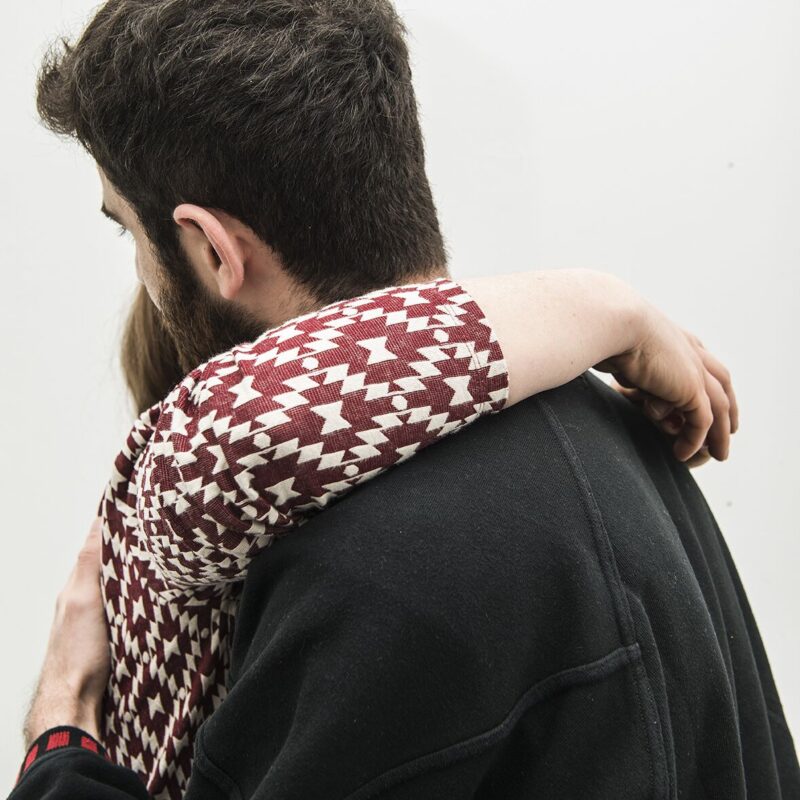Karolina Gembara, Bow: Exercises in Hospitality
Place:
Razem Pamoja Foundation
ul. Józefińska 9
Exhibition open:
26.06. - 26.07.2020
Thu-Fri 3 pm-7 pm
Sat-Sun 11 am-7 pm
Tickets:
Free admission
Bow: Exercises in Hospitality is a performative and photographic project realised with the participation of residents of Krakow, including individuals who have lived immigration experiences. The artist uses encounters in different locations around the city to examine who is a ‘stranger’ to ‘us,’ and to gauge the potential for drawing emotionally, physically, and mentally closer to the encountered person. Using the visual vocabulary of photojournalism and its documentation of both historical and contemporary migration movements, we will work out symbolic gestures of solidarity with those who have been, are, or will be on their way.
.
CURATORIAL TEXT:
One must [il faut] therefore welcome without ‘one must’ [sans ‘il faut’]: neither naturally nor unnaturally. In any case, the awaited hôte (thus invited, anticipated, there where everything is ready to receive him) is not a hôte, not an other as hôte. If, in hospitality, one must say yes, welcome the coming [accueillir la venue], say the ‘welcome’; one must say yes, there where one does not wait, yes, there where one does not expect, nor await oneself to, the other [là où l’on ne s’attend pas soi-même à l’autre], to let oneself be swept by the coming of the wholly other, the absolutely unforeseeable [inanticipable] stranger, the uninvited visitor, the unexpected visitation beyond welcoming apparatuses. If I welcome only what I welcome, what I am ready to welcome, and that I recognise in advance because I expect the coming of the hôte as invited, there is no hospitality.
— Jacques Derrida,‘Hostipitality’ [sic], in Acts of Religion,
ed. Gil Anidjar (London: Routledge, 2001), 361–362.
Holding hands, linking arms, embracing, leaning on another for support. Shaking hands. Passing a child. Salutations and salutes. Consoling. Calling out for help. Hugging. What are the gestures captured in press photographs of the refugee crisis? Gestures of love? Gestures of fear? Both contain the same double-sided potential: hope and desperation. Depriving them of their context, cutting them out of the frame, does not alter their meaning. They remain familiar human gestures. How difficult is it for us to perform them toward strangers? How hard is it to extend a welcome to an unknown person? To shake their hand, to touch, to hug? How hard is it to apply an ethics of care and empathy?
Derrida, and before him Levinas, proposed a general philosophy of hospitality. In the context of the dire circumstances of migratory movements of the past decade, these philosophers’ reflections benefit from being augmented by Feminist ethics, which nuances the concept of host and guest, layering it with notions of reciprocity, forgiveness, and embodiment.
The act of being hospitable requires a corporeal commitment, physical proximity, and an enfleshing of the ‘Other’ to remind us of their unique identity. Hospitality is therefore performed with, and directed at, the singular individual. Ethical behaviour is gestures wired to muscle and ligament. The more we use them, the easier it becomes for us to welcome The Stranger as a stranger no more.
.
Karolina Gembara’s project was realised specifically for Krakow Photomonth 2020. Since 2017, the festival team has selected an artist each year to examine a theme of their choice, with artists encouraged to explore subjects related to Krakow and its environs. The premiere of Bow: Exercises in Hospitality, in Razem Pamoja Foundation, takes place within the Main Programme of Photomonth 2020. Previous projects were Diana Lelonek’s A New Archaeology for Liban and Płaszów (2017), Michał Łuczak’s Extraction (2018) and Anna Orlowska’s Pompier, Muck, Socrococo (2020).
.
Karolina Gembara is a photographer. Since 2018, she has been a member of the Sputnik Photos collective, and was an earlier graduate of Sputnik’s Mentoring Programme. She studied art history and photography, and earned degrees in International Relations and Journalism. She is now pursuing her PhD at the SWPS University of Social Sciences and Humanities in Warsaw. Her work has been exhibited in India, Ireland, Cambodia, Nepal, and Poland; and has appeared in publications including the British Journal of Photography, the Royal Photographic Society Journal, GUP Magazine, and Ojodepez. She is the author of two photobooks: Fitting Rooms (Association of Creative Initiatives ‘ę’, 2013) and When we lie down, grasses grow from us (GOST Books, 2019). Based in New Delhi from 2009–2016, she currently lives and works in Warsaw, where she also leads photography workshops for immigrants.
.
IMPORTANT INFORMATION! Due to sanitary restrictions max 2 people are allowed to stay in the exhibition space, addition to the artist.
.
.
.


